by Julie Pigott Dillard | Jan 15, 2016
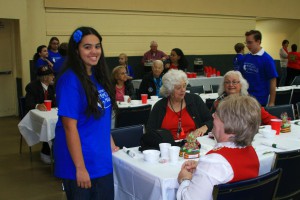
Fire Ants 4-H Club members prepare and serve meals for hospice patients and caregivers to develop compassion and empathy in their community.
There are many genetic traits you’re born with that can’t be changed. But what about traits such as compassion and empathy? Can they be learned? A new study conducted by the University of Wisconsin-Madison shows that adults can indeed be trained to be more compassionate and empathetic. But rather than wait until adulthood to grow this trait, youth involved in 4-H have the opportunity to grow compassion beginning as early as five years old. Giving back has long been one of the essential elements of 4-H programs where youth are given the opportunity to practice service to others.
The Fire Ants 4-H Club is one such club in Washington County that gives its members a chance to practice compassion and giving through its service project with Covenant Hospice. For the past two years, the Fire Ants 4-H Club has partnered with Covenant Hospice to provide volunteer services for its clients.
It began with a few members and parents volunteering to make a meal for a client. Last year, club officers applied for a Florida 4-H Foundation Community Pride grant to grow their efforts with the purpose of providing healthy, home-cooked meals for Hospice clients. Members and parents spent a day preparing and cooking made-from-scratch meals and then portioning them into individual serving containers. Over 100 individual home-cooked meals were frozen and delivered to clients. Members have also served at the past three annual Covenant Hospice banquet that honors patients and caregivers.
Community service has the ability to become life changing not just for those receiving the service but especially for the youth involved. 4-H’ers are learning through hands-on experiences that they can make a difference and that their efforts are important. Getting involved in a cause or effort that matters to youth helps develop skills and experiences that carry over into adult life and cultivate a sense of compassion for the world in which they live. If we grow youth who are more compassionate and empathetic, what does that potentially mean for our world? We are more likely to have youth who are socially responsible, who have a heart for giving back and helping others, who have positive relationships with peers and adults, who have improved communication and critical thinking skills and go into careers that feed their passions and interests.
What will you do in 2016 to grow compassion?
For more information on 4-H clubs in your county, or if you’re an adult who wants to work with youth to help them grow compassion and empathy to make help your community thrive, contact your local UF IFAS County Extension Office or visit http://florida4h.org.
by Jenny Savely | Dec 19, 2015
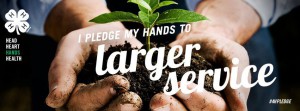
Clear evidence of mastering a skill is being able to employ it in one’s everyday life. Knowledge is only as good as how we are able to use it. 4-H dedicates itself to educating youth with research based curriculum not only for their own benefit but also so they can share that knowledge with others. When we “pledge our hands to larger service”, this can take on many forms. It may look like teaching youth in a community center about robotics or gardening, making meals for the military and first responders, or cleaning up trash in local parks. In all our service, it is important that regardless of what this looks like that we focus on meeting a need in our community. Identifying these needs is sometimes difficult if they are not part of what we see around us regularly. Talking to people who do not have the same life experiences we do is a good way to start seeing the world in a different way and thinking about ways you can help others who haven’t had the same opportunities. In Escambia County, around 30% of our youth population lives in poverty (US Census). Outcomes of living in poverty are hunger, poor housing, poor health, and lower educational scores, just to name a few. Our 4-Hers are learning to use the skills they have gained in 4-H in creative ways to help address some of these issues. One club has received a grant to raise a hog that a youth will show and have processed so the meat can be included in food boxes for local families. Another club raised funds to help support the Council on Aging to provide air conditioning units to the elderly, who are more likely to be impoverished, during the hot summer months.
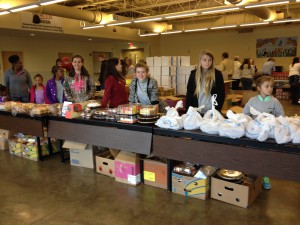
Escambia County 4-Hers assemble food boxes for local families at this year’s Farm to City event.
Whether poverty, pollution, safety, education, healthcare, or another issue is one that effects your community, the skills youth learn through 4-H can help address it. Not only does this help those around us live healthier and more productive lives, but it helps those who serve connect to their community and learn to give back. As with all 4-H projects, our goal is to help youth become more engaged and knowledgeable citizens that contribute to their world in positive ways. We encourage our youth to embody the spirit of generosity all year long, but during this season, be sure to explore the needs in your community you can help to change, even in the smallest way. If you need help thinking of how to best give back, contact your local 4-H Agent, local non-profits, or look up your county’s information in a database such as the US Census’ QuickFacts (http://quickfacts.census.gov/qfd/states/12000.html) and think about what kinds of problems might arise from the information you find there.
4-H also offers many Leadership and Citizenship projects that can help youth navigate assessing the needs of their community and putting their skills to use. You can find a few such project guides at the following links:
If you are interested in helping guide the next generation to be compassionate, active citizens for tomorrow, consider becoming a 4-H Volunteer. 4-H offers a wide variety of roles to fit your interests and schedule. Visit http://florida4h.org or contact your local UF IFAS Extension Office.
US Census. 2015. American Community Survey 2009-2013 five-year estimates, Children Characteristics: Escambia County, FL. Accessed November 18, 2015.
by Julie Pigott Dillard | Oct 6, 2015
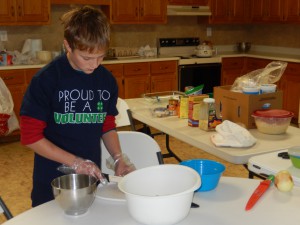
4-Her Isaac Brooks helped prepare meals for hospice patients as part of his 4-H Community Service Project.
With 4-H’s long history of community service and service learning built into the structure of the club model, 4-H members are poised to develop skills that make them highly valued students and eventually adults. And while grades and ACT or SAT scores used to be standard criteria for college admission, colleges and universities are looking for a well-rounded student in the highly competitive field of freshman admission.
By engaging in community service work, youth have the ability to explore their interests and find where their passions lie, show others what they believe in and define possible career paths. Community service also gives youth the ability to learn experientially and see that their contribution to a cause, project or event can make a difference.
Teenlife.com defines just a few of the personal benefits of youth volunteering as:
- Developing an increased sense of social responsibility
- Developing a global view of society
- Developing a heart for giving back and helping others
- Providing opportunities to apply what they’ve learned to real human needs
- Building relations and social connectedness with peers and adults
- Improving communication and critical thinking skills
- Helping find passions and interests that may leader to future career options.
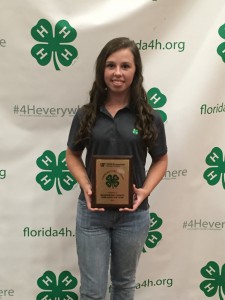
4-Her Jessica Wells accepted a Florida 4-H Community Pride Top 5 Project award on behalf of the Fire Ants 4-H Club at 4-H University.
In addition to the 4-H Community Service Project, 4-H helps fund projects through the Community Pride Program. This program helps members learn about their community and encourages them to improve their environment through completion of a service learning project. Grant funds awarded through the Florida 4-H Foundation help supplement the project. Once the project is complete, a final report is submitted for statewide competition and recognition at 4-H University as a Top 5 Florida 4-H Community Pride Project. Florida 4-H also offers similar opportunities through the Marine Ecology Program which awards mini funds to 4-H clubs to execute Service Learning in Aquatic and Marine Education and Conservation through a gift from the Guy Harvey Foundation. Community service has the ability to become life changing – for the youth involved and for those who are receiving their service.
If you would like to help 4-H grow the next generation of compassionate adults who are civically engaged, then become a volunteer. 4-H offers a wide variety of volunteer opportunities based on your skills, interests and schedule. For more information, contact your local UF IFAS Extension Office or visit http://florida4h.org/volunteers.
Tomorrow, learn how 4-H Grows Curiosity!





